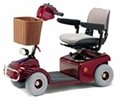
Dehydration in the Elderly
Signs & Symptoms, Possible Treatments and Tips
Dehydration in the elderly is common and occurs when the body has lost too much fluid and electrolytes (mineral compounds required by the body to regulate temperature and maintain healthy fluid balance).
It is not necessarily an emergency unless it's gone on for a long period of time. Severe dehydration in the elderly, however, can be fatal and is a common reason for hospitalization, particularly in senior citizens.
Seniors at the highest risk are those who do not drink enough or sweat frequently or severely.
Dehydration can also be caused as a side effect of medications such as diuretics or laxatives or some medical problems such as diarrhea, vomiting, heat stroke, high blood sugar (hyperglycemia) , infections or excessive exercise.
The most common signs of dehydration in the elderly are thirst (although some elderly have a decreased sense of thirst), confusion, irritability and poor skin elasticity (click here for a test for dehydration you can do at home).
It is difficult to detect dehydration until the condition is moderate or severe in nature.
Signs and Symptoms of Mild to Moderate Dehydration
- Thirst (Although some elderly have a decreased sense of thirst)
- Dry mouth, dry tongue with thick saliva
- Headaches
- Difficulty passing urine or reduced amounts that are dark yellow
- Dizziness that becomes worse on standing
- Weakness
- Sleepiness
- Urinary tract infections
- Cramping in arms or legs
- Crying with no or few tears
- Dry, warm skin
- Flushed face
- Fever
- Irritability
- Malaise
- Constipation (fluids are needed to soften and mobilize stool)
Possible Treatments for Mild Dehydration
- Drinking lots of fluids (even if individual is not thirsty)
- Consuming food and drink with sodium and potassium to restore electrolyte balance: broths or soups (contain sodium); fruit juice, soft fruits, vegetables (contains potassium); sports drinks like Gatorade that contain electrolytes
Signs and Symptoms of Moderate to Severe Dehydration
- Signs and symptoms of mild dehydration become worse
- Confusion
- Irritability
- Lethargy
- Poor skin elasticity
- Decreased consciousness/ fainting
- Lack urine output
- Shrunken eyes
- Moist, cool extremities (arms, legs, etc.)
- Severe muscle contractions in the arms, legs, stomach, back
- Rapid and faint pulse
- Low blood pressure
- Rapid breathing
- Convulsions
- Bloated stomach
- Heart failure
Possible Treatments for Moderate to Severe Dehydration
- Severe dehydration is a medical emergency and should be treated at the hospital
- Replenishment of water and electrolytes through intravenous therapy or oral rehydration therapy (solution of salts and sugars taken by mouth; this treatment is most often for dehydration caused by excessive diarrhea)
Tips to Avoid Dehydration
- Have an appropriate amount of fluids daily (usually between 6-8 glasses of water will be adequate unless exercise or other strenuous activity is completed or in hot climates)
- Encourage drinking (even if senior is not thirsty) through using smaller glasses or smaller portions (a third of a glass) in a cup can be less overwhelming for some seniors
- Check body weight regularly, fluctuations of 2-3 lbs per day may indicate irregular fluid intake
- Avoid being in the hot sun for long periods and ensure extra hydration for longer exposure
- Keep a water bottle on hand and try to drink often
- Broths or soups (contain sodium); fruit juice, soft fruits, vegetables (contains potassium) as part of general diet.
How to Test for Dehydration
To test for dehydration in the elderly, take the skin on the forearm or forehead between your index finger and thumb and squeeze gently. The skin should return to the normal position quickly.
You can try it on yourself to get an idea of how fast the skin should return to normal. If the skin takes a long period of time to return to normal or remains in the pinched position, the elder is most likely dehydrated. If you are worried, consult a physician.
Return to Elderly Health Problems
Return to Caring for Aging Parents






New! Comments
Have your say about what you just read! Leave me a comment in the box below.